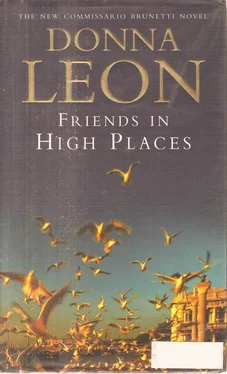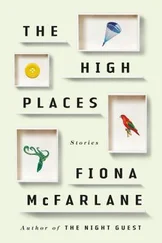Signorina Elettra reached forward and touched something on her computer. It made a sudden droning noise, and then the screen went blank. ‘I thought I’d stop now and go and have un’ ombra before lunch. Would you like to join me, sir?’ She smiled at her own flagrant boldness: a married man, her boss, and she was inviting him for a drink.
Brunetti, moved by the charity of it, said, ‘Yes, I’d like that, Signorina.’
* * * *
He made the call a little after two. A woman answered the phone, and Brunetti asked to speak to Signor Landi. He breathed silent, directionless thanks when she displayed no curiosity and said she’d get her husband.
‘Landi,’ a deep voice answered.
‘Signor Landi,’ Brunetti said, ‘This is Commissario Guido Brunetti. I’m calling from the Questura of Venice.’
Before he could go on, Landi cut him off, his own voice suddenly tight and loud. ‘Is it Marco?’
‘Yes, Signor Landi, it is.’
‘How bad is it?’ Landi asked in a softer voice.
‘I’m afraid it couldn’t be worse, Signor Landi.’
Silence drifted across the line. Brunetti imagined the man, the newspaper in his hand, standing at the phone and looking back toward the kitchen, where his wife was clearing up after the last peaceful meal she would ever have.
Landi’s voice grew almost inaudible, but there was only one thing he could have asked, so Brunetti filled in the missing sounds. ‘Is he dead?’
‘Yes, I’m sorry to tell you, he is.’
There was another pause, this one even longer, and then Landi asked, ‘When?’
‘We found him today.’
‘Who did?’
‘The police. A neighbour called.’ Brunetti could not bring himself to give the details or to talk about the time that had passed since Marco died. ‘He said he hadn’t seen Marco recently and called us to check on the apartment. When we did, we found him.’
‘Was it drugs?’
No autopsy had been performed. The mechanism of the state had not yet considered the evidence surrounding the boy’s death, had not weighed and considered it and brought judgement as to the cause of his death; thus it would be rash and so irresponsible as to merit official reprimand for an officer of the law to venture his own opinion in this matter. ‘Yes,’ Brunetti said.
The man on the other end of the line was crying. Brunetti heard the long, deep gasps as he choked on his grief and fought for air. A minute passed. Brunetti held the phone away from him and looked off to the left, where a plaque on the wall gave the names of police officers who had died in the First World War. He started to read their names, the dates of their birth and the dates of their death. One had been only twenty, the same age as Marco.
From the receiver, he heard the dim sound of a higher voice, raised in curiosity or fear, but then the sound was cut off as Landi covered the phone with his hand. Another minute passed. Then he could hear Landi’s voice. Brunetti pulled the phone to his ear, but all he heard was Landi saying, ‘I’ll call you back’, and the connection was broken.
While he sat and waited, Brunetti considered the nature of this crime. If Guerriero was right and Marco had died because his body had grown unaccustomed to the terrible shock of heroin during the time he hadn’t been using it, then what crime had been committed other than the sale of a prohibited substance? And what sort of crime was that, to sell heroin to an addict, and where existed the judge to treat it as more than a misdemeanour? If, instead, the heroin that killed him had been laced with something dangerous or lethal, how to determine at what point along the trail that stretched from the poppy fields of the East to the veins of the West that substance had been added, and by whom?
No matter how he considered it, there was no way Brunetti could see that this crime would have serious legal consequences. Nor could he see much likelihood that the identity of the person responsible would ever be discovered. And yet the young student who drew the whimsical rabbits and had the wit to hide them in different places in each of his drawings was no less dead for that.
He got up from his desk and stood at the window. The sun beat down on Campo San Lorenzo. All of the men who lived in the old-age home had answered the summons to sleep, leaving the campo to the cats and the people who crossed it at this hour. Brunetti leaned forward, resting his hands on the sill, and watched the campo as if in search of an omen. After half an hour, Landi called to say that he and his wife would arrive in Venice at seven that evening and asked how they could get to the Questura.
When Landi answered that, yes, they would be coming by train, Brunetti said he would meet them and take them to the hospital by boat.
‘The hospital?’ Landi asked, hopeless hope springing into his voice.
‘I’m sorry, Signor Landi. It’s where they’re taken.’
‘Ah,’ was Landi’s only answer, and again he broke the connection.
Later that afternoon, Brunetti called a friend who ran a hotel in Campo Santa Marina and asked if he had a double room available that he would hold for some people who might stay the night. People called somewhere by disaster forgot about things like eating and sleeping and all those intrusive details showing that life continued.
He asked Vianello to come with him, telling himself it would be easier for the Landis to recognize the police if someone in uniform met their train, though part of him knew that Vianello was the best person to take along, for himself as much as for the Landis.
The train was on time, and Marco’s parents were easy to spot as they came down the platform. She was a tall, spare woman in a grey dress that had been badly wrinkled by the trip: she wore her hair in a small bun at the back of her head, a fashion that was decades out of date. Her husband held her arm, and anyone who saw them could see that it was not a gesture of courtesy or habit: she walked unsteadily, as if in the grip of drink or illness. Landi was short and muscular, with an iron-hard body that spoke of a lifetime spent at work, hard work. In other circumstances, Brunetti might have seen the contrast between them as comic, but not now. Landi’s face was to the darkness of leather; his pale hair provided thin protection to his scalp, which was tanned the same colour as his face. He had the look of a man who spent all of his days outside, and Brunetti remembered the mother’s letter about spring planting.
They saw Vianello’s uniform, and Landi led his wife toward it. Brunetti introduced himself and his sergeant and explained that they had a boat waiting. Only Landi shook hands; only he was capable of speech. His wife could do no more than nod toward them and wipe at her eyes with her left hand.
It was quickly done. At the hospital, Brunetti suggested that Signor Landi alone identify Marco, but they both insisted on going into the room to see their son. Brunetti and Vianello waited outside, neither speaking. When the Landis emerged, some minutes later, both were sobbing openly. Procedure demanded that some formal identification be made, that the person who identified the body do so in speech or writing to the accompanying official.
When they had calmed down, the only thing Brunetti said was, ‘I’ve taken the liberty of reserving you a room for the night, if you’d prefer to stay.’
Landi turned to his wife, but she shook her head.
‘No. We’ll go back, sir. I think it’s better. There’s a train at eight thirty. We checked before we came.’
He was right: it was better this way, Brunetti knew. Tomorrow would be the autopsy, and any parent should be spared that or the knowledge of that. He led them out the emergency entrance of the hospital and back to the police boat at the dock. Bonsuan saw them coming and had the boat unmoored even before they reached it. Vianello took Signora Landi’s arm and helped her on board and then down into the cabin. Brunetti took Landi’s arm as they stepped aboard but with gentle pressure stopped him from following his wife down the steps into the cabin.
Читать дальше











